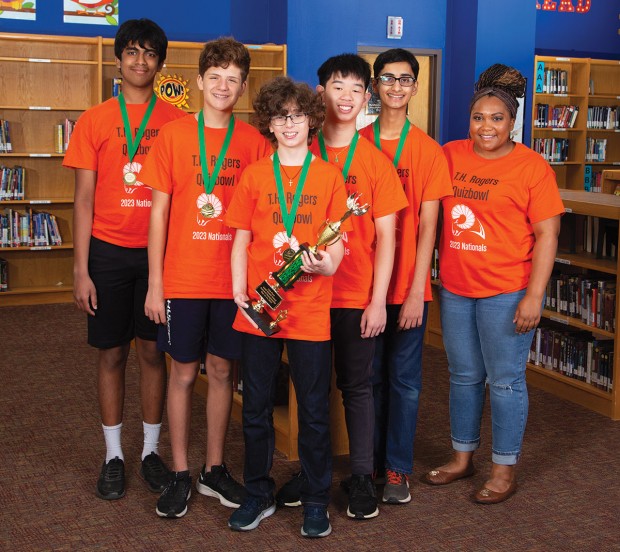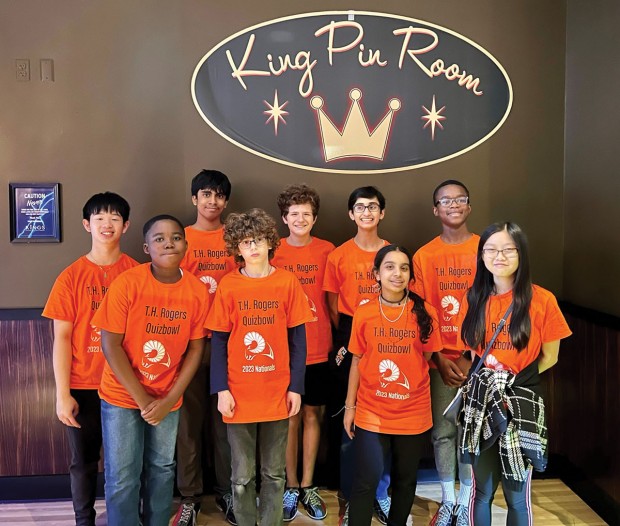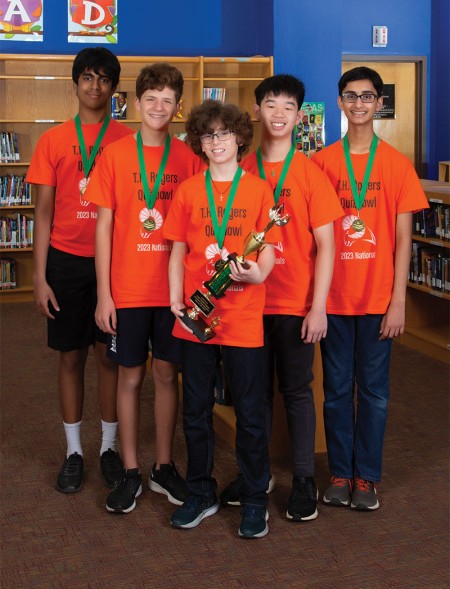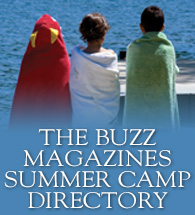Battle of Wits
Quiz bowl works your brain


BRAIN POWER The quiz-bowl teams at T.H. Rogers School work hard at their sport. Pictured is the A team, from left: Achudh Karunakaran, Sean Boyle, Leonidas Boukas, Long Nguyen, and Arjun Chhibber with their coach, Chelsea Timmons. (Photo: lawellphoto.com)
Every May, a hotel near Chicago’s O’Hare airport is taken over by middle-school students, over 600 of them from all over the country, along with their parents and coaches. It’s the Middle School National Championship Tournament, run by National Academic Quiz Tournaments (NAQT), for the academic sport known as quiz bowl.
“It’s a swirl of kids,” says Randy Takaoka, seventh-grade social-studies teacher at T.H. Rogers School, who, as the former coach of the school’s quiz-bowl teams, has attended the national competition about a dozen times.
Throughout the hotel, in 75 conference rooms, pairs of four-person teams literally match wits against each other in 18-minute games, hovering over their buzzers, as a moderator asks rapid-fire questions about literature, history, science, art, current events, and what quiz-bowlers affectionately call “trash,” which is sports and popular culture.
Quiz bowl, which is also played competitively at the high-school and college levels, is not simply mashing your buzzer button and answering the question before your competition. When it comes to the “toss-up questions,” which are asked of both teams, you are mashing your buzzer button and trying to answer quickly, but not just to beat the other team. The questions are written so that the moderator is, at first, giving you very obscure clues, but the clues become increasingly more obvious, till, by the end of the paragraph-long question, the answer is as easy as it’s going to get.
Players try to “buzz in” as early as possible because if they can answer the question before it’s read in its entirety, they earn more points. However, if a player buzzes in early and answers incorrectly, their team is docked five points, in what quiz-bowlers call a “neg.” For these toss-up questions, the players on a team cannot confer with each other. However, if a player answers a toss-up correctly, their team then gets to answer a three-part bonus question, on which they can confer. Each part of a bonus question answered correctly is worth 10 points.
The top team at T.H. Rogers, the A-team (there are currently five teams at the school), is powerful. They go to the national competition virtually every year. This past May, they placed 13th out of 160 teams. In years past, they have placed as high as 5th (in 2014) and 2nd (in 2015). According to NAQT information online, there are about 18 middle schools and 17 high schools in our area that have quiz-bowl teams. This year, Kinkaid, Strake Jesuit, Bellaire High School, St. John’s, Carnegie Vanguard, St. Thomas, and Westside High School all competed in the high-school national championship tournament, and, along with T.H. Rogers, whose A Team was the highest-scoring Houston middle-school team (the school’s B Team placed 114th), St. Thomas’ Episcopal (49th), Annunciation Orthodox (A Team 60th, B Team 126th), and St. John’s (A Team 63rd, B Team 117th) competed in this year’s middle-school national championship in Chicago.
The five-person T.H. Rogers A team consisted of two eighth graders, Achudh Karunakaran, who was captain of the A Team, and Arjun Chhibber, who led the quiz-bowl club, and three seventh graders, Sean Boyle, Leonidas Boukas, and Long Nguyen. (A quiz-bowl team competes with four players at a time but can sub out players.)
Two of the boys, Achudh and Leonidas, knew about quiz bowl because family members had played. Achudh’s brother and two of his cousins had competed for T. H. Rogers, two of them when the team came in second at nationals in 2015. Leonidas’s older brother has also competed. Jerking a thumb toward Achudh, Arjun says, “I joined mostly because he joined; we’re friends.” Sean decided to try out at the end of sixth grade when his teacher said it was fun. And Long thought it meshed well with his interest in history and politics.
Chelsea Timmons, new this year as the quiz-bowl team coach, is a seventh-grade exploratory-science teacher at T.H. Rogers. “One day, the boys cornered me, saying, ‘Please, please be our sponsor,’” she says.
“We developed a whole pitch,” says Arjun.
Though Ms. Timmons hadn’t competed in quiz bowl herself, she did participate in a similar academic competition and got to go to its nationals as a middle-schooler, so she remembered the fun and excitement and was all in. In fact, she told her old coach, who had also been a seventh-grade science teacher, what she was doing. “She was so, so excited,” says Ms. Timmons. “She said, ‘The legacy continues.’”
The boys, Ms. Timmons says, are a joy to coach. “They’re very self-run,” she says. “You don’t have to tell them to do things; they want to do them.” Once, in Chicago, she lost track of where they were. “I thought, ‘Oh my gosh!’” she says. But she soon found them. They were in a quiet corner, studying.

BOWL YOU OVER The A and B quiz-bowl teams from T.H. Rogers School took a break after the national championship tournament in Chicago in May to do some bowling. Pictured, front row, from left: Daniel Amby-Okolo, Leonidas Boukas, Mahati Kadiyala, Hanlin Li; back row, from left: Long Nguyen, Achudh Karunakaran, Sean Boyle, Arjun Chhibber, and Ahmil Mims.
“They’re so dedicated to their craft. They were even studying the day we got back to school and they showed up for practice after school, even though some of us had had flights that didn’t get in until midnight,” she says.
Kevin Boyle, Sean’s dad, was especially impressed with the team’s supportive nature in Chicago. “I saw other teams unravel, when the players would get after each other for missing a question, and it just killed those teams,” he says, “but the boys were so supportive of each other. It served our team well.”
While there are other quiz-bowl competitions for individuals, team quiz bowl really is a team effort. A team member can be a generalist, which Achudh is, but others might specialize in two or three of the quiz-bowl subjects. For instance, Sean specializes in “trash” and literature. (Sean also competes on the school’s middle-school team for the Houston Independent School District’s Name That Book competition. The T.H. Rogers middle-school team has been the reigning champions in that for the last seven years.) Long focuses on history, current events, and geography, and Leo and Arjun focus on art and science.
“I was planning to be history and science,” says Arjun, “but the team needed another art specialist, and I love fine arts now.”
Long agrees. “It’s allowed all of us to expand our horizons on multiple subjects,” he says.
So, how do you prepare for a competition where you are going to be asked random, obscure questions on pretty much any subject? There are two components. In their group practices, in home room twice a week, and after school once a week, they focus on honing their skills with the game format. They use packets of questions like the ones the moderators use, asking each other toss-up and bonus questions.
Each team member also studies on his own. Achudh estimates he spends one to three hours a day studying just for quiz bowl. Although Achudh says his quiz-bowl work has helped him develop study tactics that are helpful for school, quiz-bowl study is also different than regular studying. It’s more fun, the boys agreed. No offense, Ms. Timmons. “None taken,” she replied.
“You have a different mindset,” says Arjun, “because you are looking for clues.”

The T.H. Rogers quiz-bowl A-team placed 23rd out of 160 teams from across the country at the middle-school national tournament in May. (Photo: lawellphoto.com)
Leonidas gives an example of a clue: In a question about a painting, he says, “If they say there’s a red barn in the background, that’s usually ‘American Gothic,’” the 1930 painting by Grant Wood of a stern-looking farmer, pitchfork in hand, and his equally stern-looking daughter.
One of the boys’ favorite ways to study is to watch online videos about different subjects. A favorite on YouTube is CrashCourse. Sean, studying literature, reads a lot of poems and short stories, but for longer works, also summaries of books, such as SparkNotes study guides. There are also websites and apps dedicated to quiz-bowl prep as well as materials and books available from organizations such as NAQT and Texas Quiz Bowl Alliance (TQBA), which runs some of the competitions teams use to qualify for nationals. TQBA also offers evening classes and summer camps.
All the boys hope to continue with quiz bowl, Achudh at DeBakey High School for Health Professions, Arjun at Carnegie Vanguard High School, and Sean, Long, and Leonidas as eighth graders at T.H. Rogers.
“It’s just been such a great thing for us,” says Arjun. “It’s just been so much fun, and we got to bond over interests we all have.”
Are You as Smart as a Quiz Bowler?
Sample, from NAQT, of a middle-school national championship tournament question. The asterisk marks where, if a player answers before the moderator reads farther, they can earn extra points. The underlined portion of the answer is the minimum answer that can be given to be considered correct.
One story by this man is set in the year 2081, when “everybody was finally equal.” This author of a story about a 14-year-old genius named Harrison Bergeron wrote a novel that depicts the *firebombing of Dresden. Billy Pilgrim appears in – for 10 points – what author’s Slaughterhouse-Five?
Kurt Vonnegut (Jr.)
How’d you do?
Want more buzz like this? Sign up for our Morning Buzz emails.
To leave a comment, please log in or create an account with The Buzz Magazines, Disqus, Facebook, or Twitter. Or you may post as a guest.


